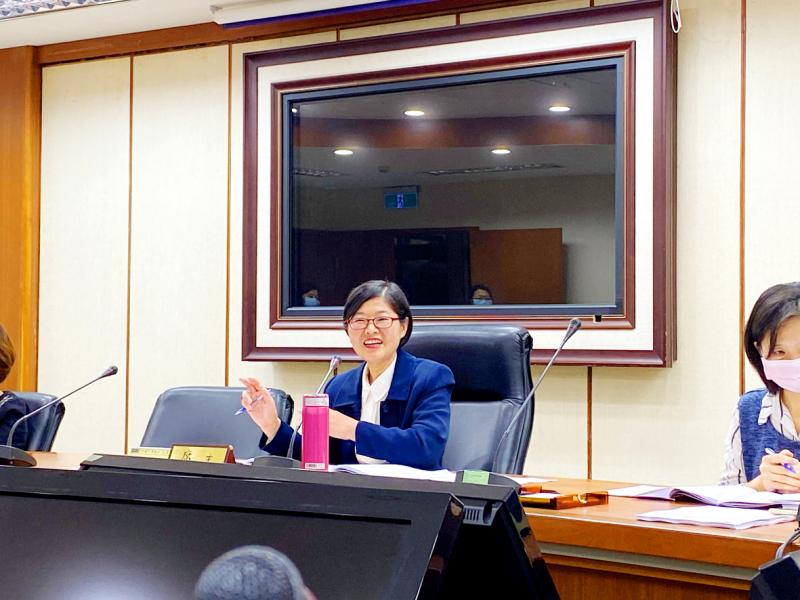Export orders declined 0.8 percent year-on-year last month to US$28.68 billion as the COVID-19 pandemic disrupted production, supply chains and logistics in China, the Ministry of Economic Affairs said yesterday.
On a monthly basis, export orders contracted 18.8 percent from US$35.31 billion, ministry statistics showed.
The ministry said it expects the decline to accelerate this month.

Photo: Huang Pei-chun, Taipei Times
Orders for information and communications technology (ICT) products, one of Taiwan’s most important export categories, was most affected as orders fell 23.4 percent year-on-year to US$6.05 billion.
“More than 90 percent of ICT products, comprised of smartphones, laptops and servers, are manufactured in China, which makes them particularly vulnerable when the country deployed stringent anti-epidemic measures,” Department of Statistics Director Huang Yu-ling (黃于玲) said.
ICT product makers reacted swiftly by moving production back to Taiwan, Huang said.
“This holds true for all product categories, as manufacturers increasingly shift production back home to mitigate the effects of the coronavirus,” Huang said, adding that overall overseas production fell to 40.7 percent last month, hitting a 15-year low.
Meanwhile, export orders for electronics bounced back after a small contraction in January to surge 20.4 percent year-on-year to US$8.82 billion, due to growing demand for semiconductors.
“Upcoming 5G deployment boosted orders for foundry services, design and packaging of integrated circuits as well as memory products,” Huang said.
However, export orders for optoelectronics continued a downward spiral despite an increase in demand for optical lenses, as flat-panel prices struggle to recover.
With part of their production in China hindered, optoelectronics makers posted a 14.7 percent year-on-year decline to US$1.34 billion in orders last month, the data showed.
Orders for traditional manufactured goods, with the exception of petrochemicals, increased by between 1.4 percent and 14.3 percent on an annual basis last month due to a low comparison base.
“While this may seem to provide some respite for traditional manufacturers after incessant declines last year, this situation is unlikely to persist ... especially not for petrochemicals, rubber and plastic products,” Huang said, referring to the recent slump in oil prices.
As COVID-19 spreads worldwide, hitting Europe and the US, export orders are expected to continue to decline this month by between 3.2 percent and 9.3 percent on an annual basis to US$33.5 billion to US$35 billion.
“The virus outbreak in China mainly upset the supply end ... but now we might be facing disruptions on end markets,” Huang said, forecasting a more than US$2 billion decline in orders for ICT makers, which are expected to be the most affected.

To many, Tatu City on the outskirts of Nairobi looks like a success. The first city entirely built by a private company to be operational in east Africa, with about 25,000 people living and working there, it accounts for about two-thirds of all foreign investment in Kenya. Its low-tax status has attracted more than 100 businesses including Heineken, coffee brand Dormans, and the biggest call-center and cold-chain transport firms in the region. However, to some local politicians, Tatu City has looked more like a target for extortion. A parade of governors have demanded land worth millions of dollars in exchange

Hong Kong authorities ramped up sales of the local dollar as the greenback’s slide threatened the foreign-exchange peg. The Hong Kong Monetary Authority (HKMA) sold a record HK$60.5 billion (US$7.8 billion) of the city’s currency, according to an alert sent on its Bloomberg page yesterday in Asia, after it tested the upper end of its trading band. That added to the HK$56.1 billion of sales versus the greenback since Friday. The rapid intervention signals efforts from the city’s authorities to limit the local currency’s moves within its HK$7.75 to HK$7.85 per US dollar trading band. Heavy sales of the local dollar by

Taiwan Semiconductor Manufacturing Co’s (TSMC, 台積電) revenue jumped 48 percent last month, underscoring how electronics firms scrambled to acquire essential components before global tariffs took effect. The main chipmaker for Apple Inc and Nvidia Corp reported monthly sales of NT$349.6 billion (US$11.6 billion). That compares with the average analysts’ estimate for a 38 percent rise in second-quarter revenue. US President Donald Trump’s trade war is prompting economists to retool GDP forecasts worldwide, casting doubt over the outlook for everything from iPhone demand to computing and datacenter construction. However, TSMC — a barometer for global tech spending given its central role in the

The Financial Supervisory Commission (FSC) yesterday met with some of the nation’s largest insurance companies as a skyrocketing New Taiwan dollar piles pressure on their hundreds of billions of dollars in US bond investments. The commission has asked some life insurance firms, among the biggest Asian holders of US debt, to discuss how the rapidly strengthening NT dollar has impacted their operations, people familiar with the matter said. The meeting took place as the NT dollar jumped as much as 5 percent yesterday, its biggest intraday gain in more than three decades. The local currency surged as exporters rushed to